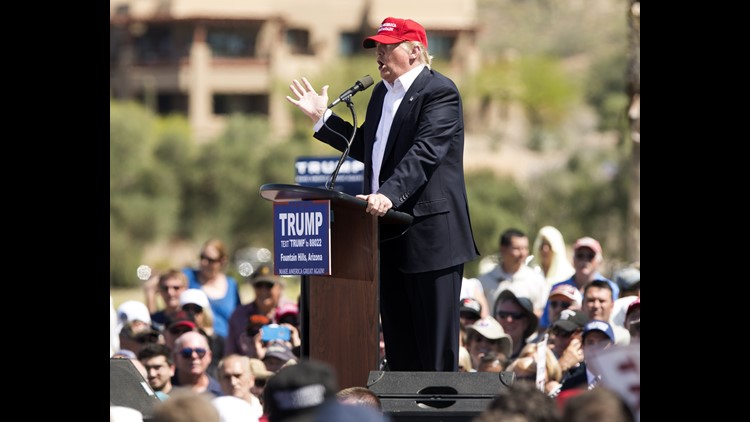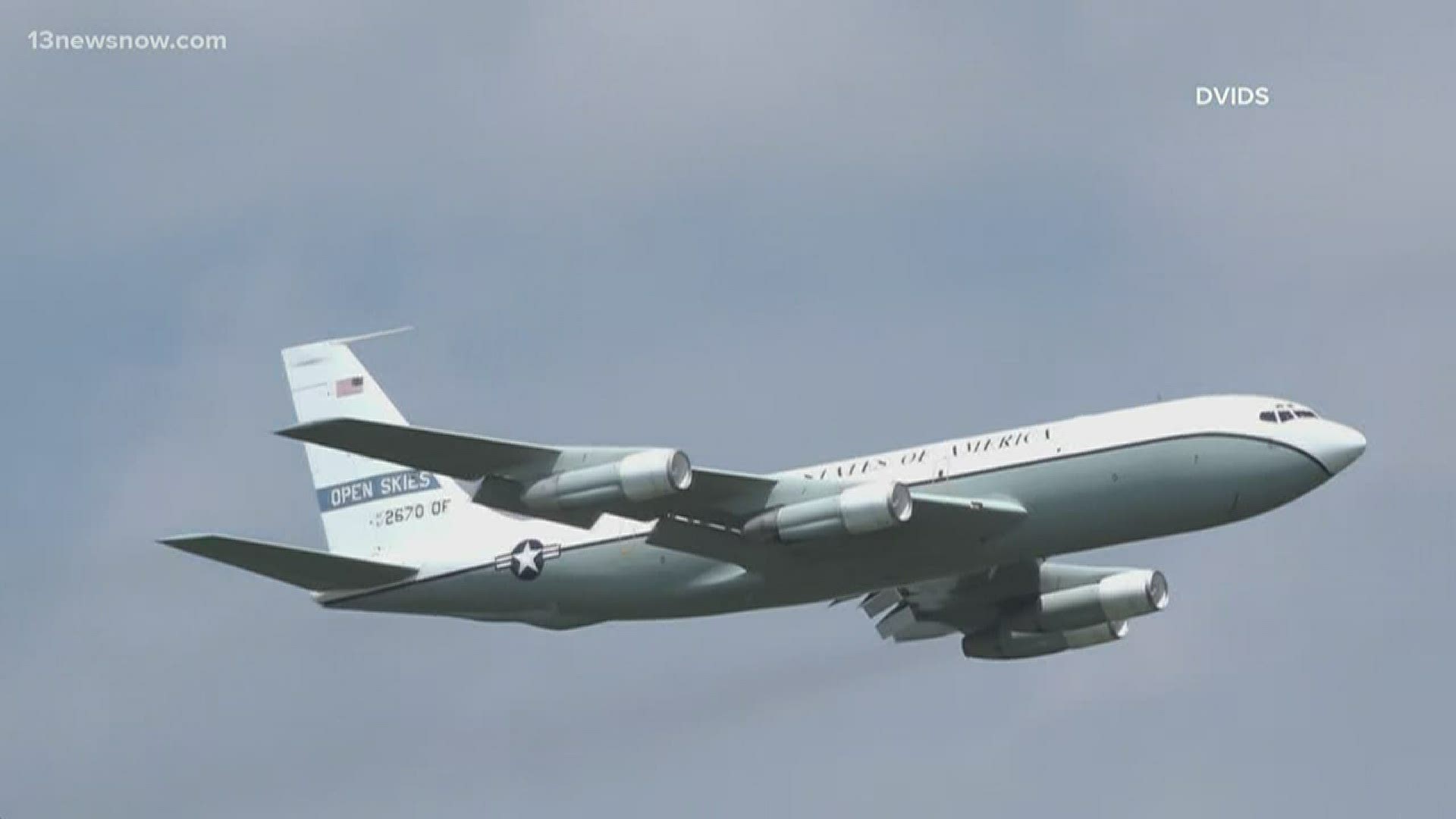![Donald Trump [image : 82023662]](http://www.gannett-cdn.com/-mm-/6fbbf2c1bc6ba1dc4cee4da910bd9e2ff1cc77d1/c=0-0-2802-2395/local/-/media/2016/03/19/Phoenix/Phoenix/635940057164059775--X5R9406.jpg)
PHOENIX — Once an afterthought in the presidential nomination process, Arizona has become a key political battlefield ahead of Tuesday's primary.
Despite the late-in-the-calendar date of the presidential preference election, as the primary is officially known, the leading Democratic and Republican combatants — Hillary Clinton, Bernie Sanders, Donald Trump and Ted Cruz — have campaigned with intensity across the state.
For front-runners Clinton and Trump, an Arizona win could represent a victory lap as they head for their parties' respective nominations. For Sanders or Ohio Gov. John Kasich, the third GOP candidate remaining in the race, an upset in Arizona could mark the start of a comeback. And for Cruz, it would help cement his status as the only serious Republican alternative to Trump.
![Trump blames 'agitators' for violence at rallies [oembed : 82048904] [oembed : 82048904]](/Portals/_default/Skins/PrestoLegacy/CommonCss/images/smartembed.png)
For Sanders, who has spent the most time courting Arizona voters ahead of the primary, a victory here could give his insurgent Democratic campaign fresh momentum after it was staggered by Tuesday's big losses to front-runner Clinton in Florida, Ohio, Illinois, North Carolina and Missouri.
Sanders, the U.S. senator from Vermont, is betting big on Democrats in the Grand Canyon State, where 75 of 85 Democratic National Convention delegates will be proportionally distributed based on the statewide vote and the vote in each of Arizona's nine congressional districts. The other 10 "superdelegates" are party leaders and elected officials.
In addition to appearances in downtown Phoenix, Tucson, Mesa and the Navajo Indian reservation near Flagstaff, Sanders is investing at least $1.5 million in Arizona television ads, at least three of them highlighting his support from U.S. Rep. Raul Grijalva, D-Ariz., one of the most liberal members of Congress.
Clinton, who is set to appear Monday in Phoenix, is equally determined to continue her family's winning streak in Arizona. She won the 2008 primary against future President Barack Obama, and in 1996 her husband, President Bill Clinton, became the only Democrat since President Harry Truman to carry Arizona in the general election. Bill Clinton is set to appear Sunday in Phoenix and Tucson.
Soundly defeating Sanders in Arizona could help clear the way for Clinton's march to the nomination at a crucial point when published reports indicate Obama has quietly begun making the case that it's time for the party to coalesce around her candidacy.
![Hillary Clinton [image : 82024636]](http://www.gannett-cdn.com/-mm-/4197d8cb02282cc3827dd17f66b03d21fd3e93b9/c=326-0-2754-2075/local/-/media/2016/03/19/Phoenix/Phoenix/635940065641622118-PNIBrd2-03-18-2016-Republic-1-A017-2016-03-17-IMG-clinton1-1-1-OMDPSOOU-L779408859-IMG-clinton1-1-1-OMDPSOOU.jpg)
Her campaign also is on the air with a series of TV ads, including one featuring former U.S. Rep. Gabrielle Giffords, the Arizona Democrat who was nearly killed in a Jan. 8, 2011, assassination attempt near Tucson. Giffords and her husband, retired NASA astronaut Mark Kelly, also are among a small legion of Clinton surrogates who swept the state on behalf of her campaign. Other surrogates active in Arizona included U.S. Rep. Maxine Waters, D-Calif., Los Angeles Mayor Eric Garcetti, former Texas state Sen. Wendy Davis and actor Sean Patrick Thomas.
A recent poll suggests Clinton may be tough to beat in Arizona.
Clinton was leading Sanders 50 percent to 24 percent, with a sizable 26 percent still undecided, according to an independent statewide telephone survey of 300 likely Democratic primary voters conducted March 7 to March 11 by veteran political scientist Bruce Merrill, an Arizona State University professor emeritus.
The poll had a margin of error of plus or minus 5.4 percentage points.
![Anti-Trump protester punched, kicked at Tucson rally [oembed : 82049484] [oembed : 82049484]](/Portals/_default/Skins/PrestoLegacy/CommonCss/images/smartembed.png)
Still, Jose Miranda, Sanders' Arizona state director, suggested a Sanders comeback could start in Arizona on Tuesday.
"We always knew this campaign was an uphill battle, and we knew the first half strongly favored Secretary Clinton," Miranda said. "As we enter into the second half of the primary campaign, we're heading toward a number of states that look favorable to Sen. Sanders. There's a path for us to win the nomination, and it starts with a good showing in Arizona, Idaho and Utah, the three states voting on March 22."
Miranda said Sanders supporters are making calls and knocking on Arizona doors to share his plans for comprehensive immigration reform and universal health care.
"People are really responding to his message. And if we can get enough people out to vote, we're confident that Arizona will be among the states that starts the second half of this campaign in the right direction," he said.
However, some political experts doubt that the Democratic nomination is still within Sanders' reach.
"It's simply a question of Bernie pulling in as many delegates as possible in order to influence the platform and pull Clinton to the left," said Larry Sabato, executive director of the University of Virginia's Center for Politics. "He's obviously not going to be the nominee."
Another political scientist, John J. "Jack" Pitney Jr. of Claremont McKenna College in California, called Sanders "a rarity in politics — a politician without an ulterior motive" who is running a principled campaign based on his political philosophy.
But Pitney, too, was skeptical of Sanders' chances. "It's really difficult to see how Sanders can do it at this point unless there is some disaster, some scandal, that completely upends the race," Pitney said.
Trump in the lead in Arizona
On the Republican side, Trump returned to Arizona as the poll leader, putting him in the strongest position to claim the state's 58 winner-take-all delegates to the Republican National Convention.
According to Merrill's poll of 300 likely Republican primary voters, Trump was ahead of Cruz 31 percent to 19 percent. Kasich, who has been endorsed by The Arizona Republic's editorial board, was third with 10 percent while Sen. Marco Rubio of Florida, who suspended his campaign Tuesday, was fourth with 10 percent. Another 30 percent was undecided.
![Sanders returns to Phoenix after visiting the border [oembed : 82049504] [oembed : 82049504]](/Portals/_default/Skins/PrestoLegacy/CommonCss/images/smartembed.png)
Merrill's GOP sample also had a margin of error of plus or minus 5.4 percentage points.
Trump has signaled an affinity for the state: A raucous rally in July helped fuel his ascent in the GOP race, and he has allied himself with Maricopa County Sheriff Joe Arpaio and former Gov. Jan Brewer, two big names in Arizona Republican politics who have national reputations as controversial and divisive immigration hard-liners.
On Saturday, Trump rallied a crowd of thousands of supporters in Fountain Hills and later campaigned in Tucson.
"Boy, oh boy, we have such great support and Tuesday is so important," Trump said at the outdoor Fountain Hills event with Arpaio and Brewer. "We have a movement going on, folks. We've got to make that movement go forward. ... Go out on Tuesday and vote -- I will never let you down. Remember."
An Arizona victory would give Trump the biggest prize Tuesday, a day when his closest rival, Cruz, is expected to have the advantage in Utah's caucuses.
![Ted Cruz [image : 82024954]](http://www.gannett-cdn.com/-mm-/c49c3d5efd78b81b244b0f5666bfa4174ed8e7eb/c=640-0-4593-3379/local/-/media/2016/03/19/Phoenix/Phoenix/635940068560868831-uscpcent02-6owwebezm6xteq6ga7y-original.jpg)
"That's a made-to-order state for him," Sabato said of Arizona and Trump. "Utah, I don't think he can carry, so he wants to split them. Cruz will get Utah and he'll get Arizona, which is a much bigger, more important state."
But a Trump defeat in Arizona would be a boon for the desperate GOP "Stop Trump" effort to block Trump from reaching the 1,237 delegates needed to clinch the party's 2016 presidential nomination.
Cruz, the conservative U.S. senator from Texas, also is competing hard in Arizona, and a big night Tuesday would solidify his standing as the only real Trump alternative in the race.
On Friday, Cruz toured the Arizona-Mexico border with former Hewlett-Packard CEO Carly Fiorina and former Texas Gov. Rick Perry, one-time rivals for the GOP nomination who have since endorsed him. He also headlined the pro-Cruz Super PAC Keep the Promise's Phoenix rally with Fiorina, Perry and national conservative radio commentator Glenn Beck, who has endorsed him.
At the well-attended rally at Arizona Christian University, Cruz said that while Trump may have been leading in the early Arizona voting, Cruz's campaign is surging now. If a strong turnout on Tuesday can "counterbalance" Trump's early advantage, "then we could do very, very well."
Cruz called Trump "a disaster" for the party who would lose to Clinton in the general election "and we lose the whole country." But he stressed that the way to beat Trump is "at the ballot box" as he has done in several state and not via a sure-to-be-controversial brokered national convention.
"We have a very direct path to 1,237 delegates, to winning the nomination outright, and that's what we are campaigning hard to do," Cruz said.
"Everything changes with Arizona," Beck added.
Kasich, whose campaign showed new signs of life when he handily beat Trump in his home state of Ohio, on Friday announced an "Arizona leadership team" that included state Reps. Tony Rivero and Bob Robson, former Brewer chief of staff Scott Smith and former Maricopa County Attorney Rick Romley.
"If Kasich were to pull this off, or Cruz, it would be pretty noteworthy," said U.S. Sen. Jeff Flake, R-Ariz., who has publicly criticized Trump and who had endorsed Rubio but now is not formally supporting any candidate. "Trump still has a long way to go before he secures enough delegates to win it outright.
"It's (the Arizona primary is) still relevant."



![Bernie Sanders [image : 82024398]](http://www.gannett-cdn.com/-mm-/d57a8ca67c29c6ec0d5cb4dd6e73c88cdd9272c3/c=349-0-3315-2535/local/-/media/2016/03/19/Phoenix/Phoenix/635940063635605259-AA2I5653-2.JPG)
